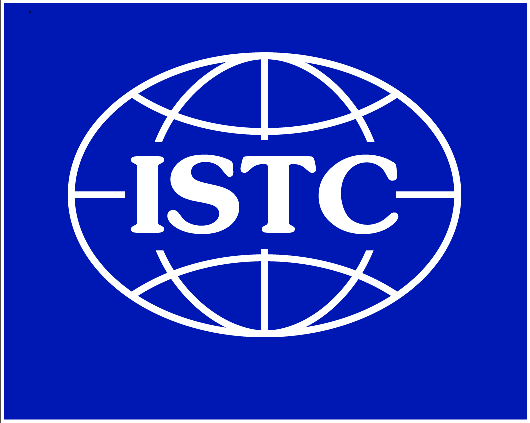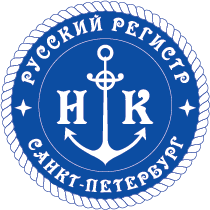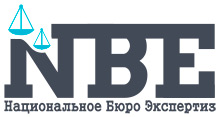NEWS AND COMMENTS
| Merry Christmas and a Happy New Year | 26.12.2014 |
|---|---|
|
Merry Christmas and a Happy New Year and hopes that all your dreams will come true! Best wishes, IDGCA President Moshkov G.Y. IDGCA Director General Ognev M.I.  | |
| The II Congress of safety advisers for the transport of dangerous goods has successfully ended its work | 22.12.2014 |
|
December, 19 the II Congress of safety advisers for the transport of dangerous goods has successfully ended its work in accordance with the agenda. Broad representation of the Ministry of Transport of the Russian Federation, compliance monitoring authorities such as Rostekhnadzor, Rostransnadzor, Ministry of Emergency Situations of Russia, as well as non-governmental organizations and the real business-structures brought an opportunity to discuss topical issues arising in the transport of dangerous goods and containers. In this case, the Congress paid attention equally to all types of transport: sea, river, road and rail transport (except aviation), as well as multimodal transport. The combination of scientific and technical reports with the background of administrative and legal issues and problems associated with the operation of business structures in the modern world helped to make the event an interesting and useful one for all participants. The results of the Congress were announced at the Roundtable. Also, all participants were given certificates of advanced training. Each participant received a handout documents, including the next issue of the magazine "Dangerous Goods and Containers", certain articles of which also aroused interest. The most interesting reports and issues will be published in the next issue of the magazine "Dangerous Goods and Containers". 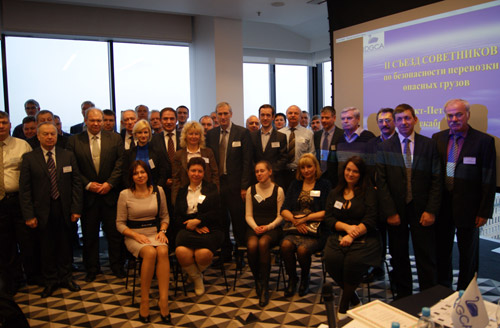 | |
| The next issue of the "Dangerous Goods and Containers" magazine | 10.12.2014 |
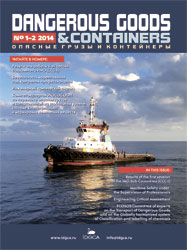
The next issue of the "Dangerous Goods and Containers" magazine (1-2, 2014) is coming the next week. It is timed to the II Congress of safety advisers for the transport of dangerous goods which is held on December, 17-18. Contents of the magazine:
| |
| Ministry of Transport of the Russian Federation supported the II Congress of safety advisers for the transport of dangerous goods | 18.11.2014 |
|
The active preparation for the II Congress of safety advisers for the transport of dangerous goods is continuing. Ministry of Transport of the Russian Federation expressed its support for this event and inform IDGCA about the participation of his three representatives by the official letter on behalf of the State Secretary - Deputy Minister of Transport of the Russian Federation S.A. Aristov. | |
| 4th session of the RID Committee of Experts’ standing working group | 14.11.2014 |
|
From 17 to 20 November in Madrid goes the 4th session of the OTIF’s (The Intergovernmental Organization for International Carriage by Rail) RID Committee of Experts’ standing working group. OTIF - an international organization established in accordance with the Convention on International Carriage by rail road to which was joined Russia too on a par with other countries. During the session the proposal for amendments to RID will be discussed. Among them presented the proposal prepared by IDGCA concerning the use of flexible bulk containers (FBC). The results of this session will be published on the IDGCA web-site as soon as they become available. | |
| 15 years anniversary of the "National Bureau of Expertise" | 11.11.2014 |
|
On November 12 a reliable IDGCA partner - LLC «National Bureau of Expertise» (LLC «NBE») celebrates its 15th anniversary since the foundation. Experts of the «NBE» in conjunction with the IDGCA’s experts solves unique problems of harmonization and practical application of international and national regulations and standards for many years. LLC «NBE» has proved itself to Russian and foreign customers as an open and professional company working in the field of evaluation of industrial and transport safety and performs a wide range of services for offshore development, the construction of new terminals and hazardous production facilities. | |
| Flexible bulk containers approved for the carriage by automobile transport in international traffic | 06.11.2014 |
|
From 3 to 7 November in Geneva goes the 97th session of the Working Party on the Transport of Dangerous Goods by Inland Transport Committee. During the session the proposals for amendments to Annexes A and B to the ADR will be discussed. The proposal submitted by the IDGCA regarding the use of Flexible bulk container (FBC) during carriage by automobile transport was accepted. The requirements formulated on 96 sessions of Working group to the vehicles intended for transportation of flexible bulk containers are described below:
So, the long-term IDGCA’s work in adoption the rules and requirements of transportation flexible bulk containers by automobile transport in international traffic is successfully completed. IDGCA thanks all experts and specialists who participated in this work and first of all – Chief of Dangerous Goods and Special Cargoes Section? Secretary of the UNECE Sub-Committee of Experts on the Transport of Dangerous Goods - Mr. Olivier Kervella, Chairman of the UN Sub-committee of Experts on the Transportation of Dangerous Goods, Head of the Dangerous Goods Division at the UK Department for Transport - Mr. Jeffrey M. Hart and the IDGCA’s expert, Technical director of ZAO «New Technologies in Transport»- Mr. Emil Akhundov. More information about the 97th session will be published on the IDGCA web-site after it ends. | |
| Schedule of meetings of committees and sub-committees of the ECOSOC and the UNECE in 2015 | 06.11.2014 |
| Preparation for the Congress of safety advisers for the transport of dangerous goods is continuing | 21.10.2014 |
|
Preparation for the Congress of safety advisers for the transport of dangerous goods, which will be held on 17-18 December 2014, is continuing. Provisional program of the Congress is updated. Representatives of oil companies, ports and container owners Confirmed their participation. Among them: "BASF", ZAO "Containerships St. Petersburg," TOO "Caspiy Ak Jhelken", OOO "St. Peter’s Terminal", "Union Scientific Research Center of Transport Technology", "Arkhangelsk Sea Commercial Port", "Gas-Oil" Ltd, "Gas-Oil Baltic" Ltd, "Norilsk Nickel" and others. The organizers of Congress ask all participants to submit questions, which, in their opinion, should be considered at Congress, to the IDGCA secretariat at info@idgca.ru. | |
| IMO comes to electronic certificates | 17.10.2014 |
|
Facilitation Committee (Facilitation Committee (FAL)) of the International Maritime Organization (IMO), at its 39th session, approved some guidelines on the use of electronic certificates. According to many the maritime organizations, the new guidelines - is a big step forward on the introduction of electronic certificates. In this case, significant technical or legal obstacles to start their implementation does not exist. Many states have long sought to lead international rules of navigation in conformity to the 21st century, including, reduce the amount of documentation and remove barriers to the shift to electronic documents. At the meeting of the Facilitation Committee, progress has been made in the transition from paper to electronic media and other areas. After five years of work the FAL Convention has been updated. Amendments to the Convention FAL will be taken at the next session of the Committee to be held in 2016. | |
| World Standards Day | 14.10.2014 |

Every year on October 14 throughout the world celebrates the Day of standards - international date, designed to draw people's attention to the importance of action, related to the establishment of common standards, and acknowledge the contributions of tens of thousands of professionals who dedicate their lives and professional skills of responsible and necessary work. On this day in 1946 in London the conference of national standards organizations was hosted. 25 countries, including the USSR, were represented by 65 delegates. The result of their work was the decision to establish the International Organization for Standardization - International Organization for Standardization (ISO). World Standards Day is an initiative of the largest developers of standards: International Organization for Standardization (ISO), International Electrotechnical Commission (IEC) and the International Telecommunication Union (ITU), together with members and partners. | |
| II Congress of safety advisers for the transport of dangerous goods | 25.09.2014 |
|
During the period 17 to 18 December 2014 International Dangerous Goods and Containers Association (IDGCA) in conjunction with Non-state Private Institution of Additional Professional Education “International Staff Training Centre” (ISTC) carry out the Congress of safety advisers for the transport of dangerous goods. IDGCA invites councilors decertified in ISTC, representatives of regulatory and control bodies, the persons responsible in companies for the transportation and carriage of dangerous goods on all types of transport and all interested executives and specialists of enterprises and organizations to participate in the 2nd Congress councilors on the safe transportation of dangerous goods. | |
| The 25th session of the Joint Meeting of Experts on the Regulations annexed to the European Agreement concerning the International Carriage of Dangerous Goods by Inland Waterways (ADN) (ADN Safety Committee) | 21.08.2014 |
|
The 25th session of the Joint Meeting of Experts on the Regulations annexed to the European Agreement concerning the International Carriage of Dangerous Goods by Inland Waterways (ADN) (ADN Safety Committee) will take place in Geneva during the period from the 25th to the 29th of August, 2014, where will be discussed:
"IDGCA" sends the delegation of experts to participate in the session. | |
| The next release of specialists | 02.07.2014 |
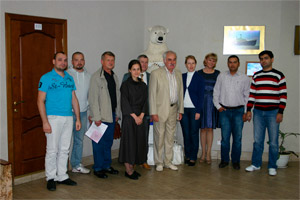
In the period from 23 to 27 June 2014 at the International Staff Training Center another group of specialists in the transport of dangerous goods, loading and unloading operations relating to them was trained. The group includes senior staff and specialists from the following companies: OOO "Branan Environment", "Gazpromneft Terminal SPB", Dragon Oil Turkmenistan, OOO "Cargo Trust", OOO "Sea Fishing Port", OOO "Shipping company" Sea Energy ", OOO "Multipurpose Reloading Complex", OOO "Managing technological transport and special equipment" and ZAO "Schenker". Students have studied the fundamental provisions of international and national legal base that regulates the transportation and handling of dangerous goods at the various types of transport, the main directions of activities to ensure transport safety, were informed of the modern legislative base in the industrial safety, have studied the order of priority action in case of incidents during dangerous goods transportation and handling and incident reporting. By training results was held the questionnaire of listeners. They noted the high quality and the level of knowledge, the originality of information, its practical and scientific importance. The teaching staff of the training center also received good reviews. Specialists who have successfully passed training and conform to their education, experience and position qualification requirements for safety advisers for the transport of dangerous goods, have been certified as such by the commission of the International Association of dangerous goods and containers. Next training courses for the implementing transportation of dangerous goods, loading and unloading operations relating to them will be held from 14 to 18 July 2014. Welcome to the courses! | |
| An official proposal to the 25th session of UNECE Working party on the transport of dangerous goods in Geneva from 25 to 29, August 2014. | 02.06.2014 |
|
IDGCA has prepared an official proposal to the 25th session of UNECE Working party on the transport of dangerous goods, which will take place in Geneva from 25 to 29, August 2014. The official proposal is based on the test results on flexible bulk containers (FBC) ВК3 tested in Krylove State Research Centere, Saint-Petersburg for their further application to the international carriage of dangerous goods. The experts of IDGCA suppose, that positive test results allow the experts of AND Safety Committee to approve the appropriate changes to AND, and application of BK3 to the carriage by inland waterways. | |
| 96th session of UNECE working party on transportation of dangerous goods | 14.05.2014 |
|
96th session of UNECE working party on transportation of dangerous goods took place in Geneva from 06 to 09, May 2014.
It was attended by representatives from different countries such as Austria, Belgium, Bulgaria, Hungary, Germany, Denmark, Israel, Ireland, Spain, Italy, Latvia, Lithuania, Luxemburg, Malta, Netherlands, Norway, Poland, Portugal, Russian Federation, Serbia, Slovakia, the United Kingdom and Northern Ireland, Finland, France, Czech Republic, Switzerland, Sweden, from intergovernmental and nongovernmental organizations. The working party considered ADR 2015 updating and other issues, concerning safety transportation of dangerous goods. For more information please follow www. unece.org. IDGCA representative Mr. Emil Akhundov submitted the FBC (flexible bulk container) tests results to the working party’s approval. FBC was tested in Krylove State Research Centere, Saint-Petersburg. Because of the late submission, the members of the working party made a decision to put this issue on the 97th session in November 2014, to have enough time for the full consideration of FBC test results. | |
| Continued testing of a heavy soft container | 18.04.2014 |
|
On Wednesday, the 23rd of April, 2014 the next scheduled testing of 14-tons soft specialized soft container MK 14-10 will take place in Saint-Petersburg on the territory of Krylov State Research Center (KSRC). The program of testing includes falling impact test, rollover test, test for rising from a horizontal position to a vertical position, stacking test. Experts of the Federal Institute for Materials Research and Testing, IDGCA and "Russian Register" JSC will participate in the testing. Test results will be presented at the next meeting of UN experts in Geneva, which will be held since the 5th to the 9th of May, 2014. | |
| Cooperation Agreement between the Ministry of Transport of the Russian Federation and Noncommercial Partnership "International Dangerous Goods and Containers Association" | 11.04.2014 |
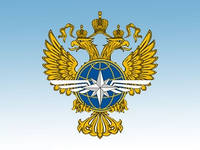 
On the 10th of April, 2014, Minister of Transport of the Russian Federation, Maxim Sokolov, signed a cooperation agreement with International Dangerous Goods and Containers Association. This Agreement is a framework agreement aimed at development of transport industry. It involves participation of "IDGCA" in events on issues of mutual interest in the field of effective development of transport sector and improvement of the legislation, as well as conduction of joint consultations, meetings, conferences and seminars for exchange of experience. | |
| Training of specialists in transportation of dangerous goods by road | 09.04.2014 |
International Staff Training Center began training of drivers of vehicles carrying dangerous goods. The areas of training:
At the same time, the institute continues training of advisers for safe transportation of dangerous goods in accordance with the requirements of paragraph 1.8.3 of the rules of European Agreement concerning the International Carriage of Dangerous Goods by Road (ADR) applied on the territory of the Russian Federation since the 25th of April, 2013 in accordance with the Decree of the Government of the Russian Federation № 272 dated the 15th of April, 2011, "On approval of rules for the transportation of goods by road". | |
| Dangerous goods inspector at sea and river transport | 28.03.2014 |
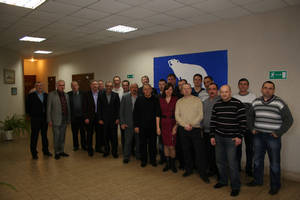
The course of training of Rostransnadzor inspectors was completed on the 27th of March, 2014, in St. Petersburg. It was for the first time in Russian practice when state inspectors were trained under a special program for public service employees exercising supervision activities. The special training program was developed by IDGCA experts in association with ISTC and was agreed with the Federal Service for Transport Supervision. On a par with studying of international conventions, agreements and regulations, the trainees received practical skills to perform supervisory functions associated with dangerous goods. IDGCA believes that professional training of public service employees will increase their prestige among transport business entities and will improve safety of transport and seaports. Together with receiving of certificate on additional education, the employees of Rostransnadzor were attested at IDGCA and received qualification certificates of competence "Dangerous goods inspector at sea and river transport". In total 19 people from different regions of Russia were trained. | |
| The Government proposes to clarify the rules for issuing of permits for transportation of dangerous goods | 27.03.2014 |
|
The State Duma Transport Committee is considering the government bill aimed at improving of the rules regulating the movement of vehicles carrying dangerous, heavy and (or) oversize cargoes. It is referred to amending of the Federal Law № 257-FZ dated the 8th of November, 2007 "On highways and road activities in the Russian Federation and on amendments to certain legislative acts of the Russian Federation" and the Federal Law № 127-FZ dated the 24th of July, 1998 "On state control over international road transportation and responsibility for violation of its performance". The bill corrects the rules for issuing of permits for such transportation. In particular, it is proposed authorize Rostransnadzor to issue special permits for movement of vehicles carrying dangerous goods, regardless of the ownership of a road. At the same time, it is provided that executive authorities of the Russian Federation and local government authorities will lose such authority. In addition, according to the bill, transportation of heavy cargo by vehicles the weight of which does not exceed maximum permissible values (weight or axial loads) more than by 2%, may be performed without issuing of special permit. It is also provided that these values, as well as sizes of such vehicles, should be established by the Government of the Russian Federation. According to the Cabinet of Ministers, adoption of the bill would reduce the number of appeals to the competent authorities for obtaining of public services for issuance of permits, and also would lead to better quality of these services. As it is noted at memorandum, the provided two percent value is insignificant and meets the requirements of the current standard for weighing equipment and the International Convention on the Harmonization of Frontier Control of Goods. The bill № 350646-6 "On amendments to certain legislative acts of the Russian Federation in terms of improving of the rules regulating the movement of vehicles carrying dangerous, heavy and (or) oversize cargoes by roads" was adopted in the first reading. | |
| Constitutional Court of the Russian Federation has defended legal entities from excessive administrative fines | 21.03.2014 |
|
Constitutionality of provisions of the Code of Administrative Offences, which establishes minimum fines amounts for legal persons for certain offenses (100 thousand rubles and more) was litigated. By Constitutional Court decision dated the 25th of February, 2014, № 4-П, the provisions establishing such high fines are deemed to be unconstitutional. In conjunction with the general rules for application of administrative penalties they do not allow to inflict a penalty below the lower limit. Thus, these regulations do not allow to take proper account of nature and consequences of the offense, the degree of guilt of a legal entity, its property and financial status, as well as other circumstances, which are essential for the individualization of responsibility. The Constitutional Court of the Russian Federation noted that "the tendency of strengthening of administrative responsibility, including increasing of minimum administrative fines imposed on legal persons for certain administrative offenses, is spreading more and more", "we can not exclude the conversion of administrative penalties with significant minimum limits from a corrective action aimed to prevent administrative offenses into an instrument for suppression of economic independence and initiative, instrument for excessive restriction on freedom of enterprise and the right of property". Such findings of the Constitutional Court have a real basis. The example of this, in our opinion, is law enforcement practice of bringing legal entities to administrative liability under Part 1, Article 14.47 of the Administrative Code of the Russian Federation for issuing of certificate of conformity with violation of legislation concerning technical regulation which became common over the last six months. As a rule, the following violations are fixed: violations of the requirements of paragraph 6 of the Regulations for execution of certificate of compliance with the Technical Regulations of the Customs Union approved by the decision of Board of the Eurasian Economic Commission dated the 25th of December, 2012, № 293, in particular, lack of information on the name and details of the document, according to which the products were manufactured, and product information ensuring its identification (type, model, article, etc.) in the certificate; lack of information indicating the phone number, fax and e-mail addresses of the applicant, etc. in the certificate. Let us note that Part 1, Article 14.47 of the Administrative Code establishes minimum fine for legal entities in the amount of 400 thousand rubles. Given that violations committed in issuance of each certificate form a separate administrative offense, the amount of fines in the aggregate can reach millions. It can be assumed that such penalties are hardly commensurate with the nature of the offense, the degree of guilt and the consequences. As it was noted by the Constitutional Court of the Russian Federation, for small businesses and non-profit organizations such high fines are accompanied by significant encumbrances. The latter can be prohibitive for them and lead to very serious consequences, up to a forced liquidation. Moreover, failure to pay the fine on time may result in doubling of the fine. In order to bring the regulatory administrative fines imposed for legal entities and the rules of their application in accordance with the constitutional requirements, a federal legislator should introduce corresponding amendments to the Administrative Code of the Russian Federation. There are different ways. The minimum amount of fines can be reduced, softer alternative sanctions can be established, fines for various categories (types) of legal entities can be differentiated, rules of imposing and execution of administrative punishments can be clarified (changed). When this the legislator is not prevented from fixing of limit amount of fines to legal entities, below which the fine can not be reduced. Before making changes to the Administrative Code, minimum fine for legal entities, which amounts 100 thousand rubles or more, can be reduced below the lower limit by the court decision. This legal proposition of the Constitutional Court of the Russian Federation is applied to the Administrative Code regulations establishing minimum penalties for legal entities in the amount of 100 thousand rubles or more. | |
| Testing of plastic big bag MK 14-10 | 18.03.2014 |
|
Testing of plastic big bag MK 14-10 with high-capacity to 14 tons was carried out in St. Petersburg in Krylov State Research Centre. According to the recommendations of UN experts this equipment had to withstand six-fold load, which is 119 tons. The tests have shown that MK 14-10 withstands load of 87 tons, which is an absolute record for plastic big bags used for transportation of dangerous goods. The tests have also determined the need to enforce the construction of big bag to reach maximum test load of 119 tons. All works on promotion of transport containers to the international transport market are carried out in the framework of "IDGCA" and its members’ activities. The test results are presented to UN experts meeting, which takes place this week in Bern (Switzerland). The manufacturer and the financial sponsor of the program is "IDGCA" member, "Novye Tekhnologiyi v Perevozkakh" Company ("New Technologies in Transportation" Company). | |
| Training of inspectors of State Maritime and River Supervision | 11.03.2014 |
|
In the period from the 17th to the 27th of March, 2014, inspectors of State Maritime and River Supervision of the Federal Service for Supervision of Transport will receive training at International Staff Training Center under the program "Training of inspectors of State Maritime and River Supervision of the Federal Service for Supervision of Transport for supervision of safe transportation of dangerous goods" developed by specialists of International Dangerous Goods and Containers Association and International Staff Training Centre and agreed with the Federal Service for Supervision of Transport. Such training will be conducted for the first time, and the program itself is unique. | |
| Tests performance under technical supervision of UN experts | 11.03.2014 |
|
Testing of soft container MC-14-10 will be conducted on the 12th of March, 2014 at Krylovskiy State Research Center (KSRC). These tests will be conducted in order to provide the results to UNECE Subcommittee and to amend International Regulations Concerning Transportation of Dangerous Goods. The tests will be performed under technical supervision of IDGCA experts, VAM experts, "CNIIMF" JSC experts and "Russian Register" JSC experts. | |
| With a holiday on March 8 | 07.03.2014 |

We heartfully congratulate precious women with the International Women’s Day 8 of March! We wish you good health, family well-being, happiness, love and mutual understanding! Let the harmony always accompany you in love and at work! President Moshkov G.Y. Director General Ogne M.I. | |
| Freight transport carrying dangerous goods, will be equipped with tachographs with cryptographic protection of information | 28.02.2014 |
|
According to information published on the official site of Federal State-Funded Institution "Road Transport Agency" (FBU "Rosavtotrans"), Ministry of Justice of the Russian Federation has registered the order by Minister of Transport of the Russian Federation № 273 dated the 21st of August, 2013 "On approval of equipping vehicles with tachographs" and the order by Minister of Transport of the Russian Federation № 470 dated the 17th of December, 2013 "On Amendments to the Order of Ministry of Transport of the Russian Federation №36 dated the 13th of February, 2013". The approved documents contain requirements for equipping buses and cargo vehicles with new-generation tachographs with cryptographic protection of information (CIPF). In particular, cargo vehicles carrying dangerous goods must be equipped with tachographs with CIPF since the 1st of April, 2014. For information: tachograph is a technical control device designed to record information about speed and route of movement of vehicles, as well as about work and rest schedule of drivers of vehicles. According to legislation of the Russian Federation, all cargo vehicles weighing more than 3.5 tons and passenger buses should be equipped with tachographs by the 23rd of January, 2012. Since the 1st of April, 2014 amendments to the Administrative Code will come into force. These amendments establish administrative responsibility for absence of a tachograph and for violation of work and rest schedule of drivers. However, this requirement does not apply to certain categories of specialized vehicles (not used for the carriage of passengers and cargoes). | |
| Regulations for Safety of hazardous industrial facilities of main pipelines have been established | 27.02.2014 |
|
Federal regulations in the field of industrial safety "Safety regulations for hazardous industrial facilities of main pipelines" were approved by Order of the Federal Service for Environmental, Technological and Nuclear Supervision № 520 dated the 6th of November, 2013. These regulations are intended for usage during process engineering, design planning, construction, operation, reconstruction, technical upgrading, overhaul, preservation and retirement of facilities; manufacturing, installation, commissioning, maintenance, troubleshooting and repair of technical equipment used; industrial safety examination. The regulations establish requirements intended to ensure industrial safety, prevention of accidents and employment accidents at hazardous industrial facilities of main pipelines, which transport hydrocarbons in liquid and/or gaseous condition (oil, petroleum products, liquefied petroleum gas, gas condensate, broad fraction of light hydrocarbons and their mixtures). The Order will come into force three months after the official publication of the regulations. Text of the Order is published in Bulletin of Normative Acts of Federal Executive Bodies № 1 dated the 6th of January, 2014. | |
| Russia - Customs Union – EU | 19.02.2014 |
|
This is the title of international conference which took place on the 13th of February, 2014, in the World Trade Center in Moscow. Issues relating to technical regulations, standardization and conformity assessment (certification) were discussed there. Among the speakers there were representatives of federal public authorities, NGOs, Customs Union and European accreditation bodies: the Head of Federal Service for accreditation S.V. Shipov, Deputy Director General of Directorate-General for Enterprise and Industry (European Commission) A. Peltomakki, Acting Head of Federal Service for Supervision of Consumer Rights Protection and Human Welfare A. J. Popova, President of Russian Union of Industrialists and Entrepreneurs A.N. Shokhin, Director of Department of State Policy in the field of technical regulation and ensuring the unity of measurements of Ministry for Industry and Trade of the Russian Federation K.V. Leonidov and other. The audience consisted mostly of Russian representatives of certification bodies and NGOs. Judging by speeches and reports, currently in Russia it takes place a process of rapprochement of Russian legislation in the sphere of technical regulation and Customs Union with European legislation. Acceleration to this process was given by recently adopted Federal Law № 412-FZ "On accreditation in national system of accreditation". It is quite clear that European accreditation institutions and foreign certification bodies are extremely interested in markets of Russia and countries of the Customs Union. The issue relating benefits for Russian manufacturers and assistance in coming into European market remains open. The head of Federal Accreditation Service, Savva Shipov, who was a speaker at the conference, said that adoption of the Federal Law "On accreditation in national system of accreditation" requires amending of about 40 laws and regulations in the sphere of technical regulation. Time will show whether such steps will be justified and whether will help to create clear and modern system of technical regulation in Russia. However, it is believed that a hasty introduction of amendments to the legislation in the field of technical regulation may create unfavorable conditions for development of Russian industry and Russian business in general. | |
| 32 railcars with gas condensate derailed and caught fire near Kirov | 06.02.2014 |
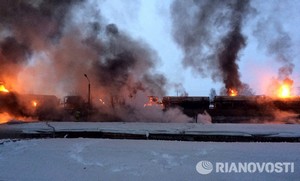
According to RIA Novosti, in the morning of the 5th of February 32 railcar with gas condensate derailed and caught fire in the region of Kirov. Causes of the accident are being investigated. The train consisted of 89 railcars. 24 of them contained coal and 65 railcars contained gas condensate. 32 of the railcars with gas condensate derailed and caught fire. About 10:00 am of the 5th of February the fire was localized. Criminal proceedings were initiated. Nearly 700 people were evacuated. However, RF Emergency Situations Ministry reported on absence of environmental threats in connection with the accident. Fortuitously interaction of two hazardous substances under UN classification (coal - class 4, gas condensate - hazard class 2) has not occurred, and, according to experts, this fact enabled to avoid a major disaster. | |
| Changes in legislation on transport safety have been introduced | 06.02.2014 |
|
Russian President Vladimir Putin has signed the Federal Law № 15-FZ dated the 3rd of February, 2014 "On Amendments to Certain Legislative Acts of the Russian Federation relating to transport safety". The document amends... Next | |
| On introduction of amendments to certain legislative acts of the Russian Federation in connection with adoption of the Federal Law "On accreditation in the national system of accreditation" | 05.02.2014 |
|
A draft law "On Amendments to Certain Legislative Acts of the Russian Federation in connection with adoption of the Federal Law "On accreditation in the national system of accreditation" was introduced to the State Duma. This document provides... Next | |
| Since the 1st of January, 2014 local Rostekhnadzor offices have responsibility for entering information into the Register for conclusions of industrial safety expert examination | 22.01.2014 |
|
Temporary procedure for entering information into the Register for conclusions of industrial safety expert examination (hereinafter - Temporary procedure) was approved by the order of Federal Service for Environmental, Technological and Nuclear Supervision, № 1-rp, dated the 10th of January, 2014. Temporary procedure establishes that industrial safety expert conclusion is to be submitted by the client to the local RTN office at location of the subject of expert examination. If the subject of expert examination is located outside the territory of the Russian Federation, for entering into the Register expert conclusion can be submitted to any local office at the applicant's choice. Together with the expert conclusion, written application for entering into the Register should be submitted. The recommended form of this application is attached to the temporary procedure. Entering of the information into the Register will be executed within 5 working days from the date of registration of the application. In the absence of information listed in the Temporary procedure in the application, or if such information was not presented to the full extent, RTN territorial authority will not refuse to accept the application, as is usually the case, and will send the applicant a notice of the need to eliminate the identified deficiencies. In December 2013 a draft of Administrative Regulations by Federal Service for Ecological, Technological and Nuclear Supervision for rendering state services for maintaining the Register of industrial safety expert conclusions was published. Its provisions were in conflict with the applicable legislation and the interests of a wide range of Russian and foreign companies operating in the field of industrial safety. Experts of International Dangerous Goods and Containers Association addressed to the Head of RTN with a letter where comments and suggestions on the draft of Administrative Regulations (№ 792 dated the 30th of December, 2013, copies were sent to the Ministry of Justice of the Russian Federation and Russian Union of Industrialists and Entrepreneurs) were submitted. Contents of the Temporary procedure approved by RTN order № RTN 1-rp dated the 10th of January, 2014 indicates that "IDGCA" application was taken into account; it can be assumed that the Administrative Regulations for maintaining of the Register of industrial safety expert conclusions will not come into force as it is currently drafted. "IDGCA" expresses gratitude to RTN managers for consideration and taking the application into account and for preparing a temporary legal act meeting the interests of all entities relating to industrial safety. | |
| Checking of vehicles carrying dangerous goods in Primorye | 22.01.2014 |

According to RIA Novosti information received from Vladivostok on the 21st of January, after the accident with gasoline tank truck, which occurred on the 16th of January, Primorye highway patrolmen will conduct preventive measures "Dangerous goods". About 07.00 local time (00.00 Moscow time) on the 48th kilometer of highway Rudnaya Pristan’, Plastun Terneysky district, a truck with diesel fuel overturned. According to EMERCOM, up to 5 tons of fuel spilled into a ditch on an area of 8 square meters. During the checking, which will be held on the outskirts of Vladivostok, highway patrolmen will check freight transport carrying dangerous goods. In addition to checking of drivers’ documents they will check technical condition of the vehicles. Let us recall that Rules for transportation of dangerous goods by road prescribed by ADR are in force on the territory of the Russian Federation since the 25th of April, 2012. | |
| News from International Organization for Standardization (ISO) | 20.01.2014 |
|
The 37th General Assembly of International Organization for Standardization (ISO) will be held in the period from the 10th to the 12th of September, 2014 in Rio de Janeiro (Brazil). ISO was founded in 1947 and since then has published over 19 500 international standards that are being applied to almost all aspects of technology and business. National standardization agencies of 163 states are members of ISO. ISO Central Secretariat (Geneva, Switzerland) coordinates the work of the whole system. ISO is an independent, non-governmental organization. In some countries, including former Soviet states, quality management standards ISO 9000 series, in a sense, replaced tens of thousands of standards which define requirements for product quality and safety. Unfortunately, many consumers and producers have a fallible judgment that certificate of conformity to ISO 9000 standard certifies the quality of products and services. This false opinion had a negative impact on industries of Russia and former Soviet states. Over 19,500 international standards applied within ISO system are an invaluable asset of each state, studying and application of these standards is a way to technical progress. "IDGCA" NP participates in work of ISO technical committee ISO/TC 220 "Cryogenic vessels". Currently draft standards relating to fixed and portable cryogenic vessels with vacuum insulation (ISO/DIS 20421-2, ISO/DIS 21009-2, ISO/CD 21029-1, ISO/DIS 21029-2), compatibility of structural materials of the vessels with gases (ISO/FDIS 21010), the requirements for structural materials to be operated at temperatures of cryogenic range (ISO/AWI 21028-1, ISO/AWI 21028-2), valves of cryogenic vessels (ISO/CD 21013-3 , ISO/NP 24490), etc. are under consideration of ISO technical committee. | |
| New rules for industrial safety expertise came into force since the 1st of January, 2014 | 20.01.2014 |
|
The Order of Federal Service for Environmental, Technological and Nuclear Supervision №538 dated the 14th of November, 2013 "On approval of federal rules and regulations in the field of industrial safety "Rules for industrial safety expertise" (registered with the RF Ministry of Justice on the 26th of December, 2013, registration № 30855) entered into force since the 1st of January, 2014. The regulations establish procedures for expert examination, requirements for execution of conclusions and requirements to the experts in the field of industrial safety. These regulations are not to be applied within facility examination in conclusion of compulsory insurance agreements or during its insurance period in order to assess damage that can be caused by the accident at the facility, maximum possible number of victims and (or) level of safety. Examination of buildings and structures at the facility, which are designed for process procedures, storage of raw materials or products, movement of people and cargoes, localization of accidents and rectification of the consequences should be carried out in the presence of industrial safety requirements. Examination of technical devices, buildings and structures at the facilities used in the national defense and security interests should be carried out with due consideration of requirements of national security legislation and protection of state secrets. A number of decisions of Federal Mining and Industrial Supervision of Russia are not to be applied any longer. These are acts on approval of Rules for industrial safety expertise and declarations of industrial safety, Provisions on industrial safety expertise in coal mining, at production facilities of various categories. Rostekhnadzor Order №1005 "On approval of Procedure for industrial safety expert evaluation, plans of accident localization and emergency response plans at explosive, flammable and chemically hazardous industrial facilities and requirements applicable to expert conclusion execution" is declared invalid. | |
| Law "On accreditation in national accreditation system" was signed by Russian President Vladimir Putin. The Government approved the draft amendments to Administrative Offences Code vesting Rosakkreditatsiya with the right to carry out administrative investigation | 17.01.2014 |
|
December 28, 2013 - Russian President Vladimir Putin signed the Federal Law № 412-FZ "On accreditation in national accreditation system". This law will enter into force 180 days after its official publication, but not earlier than the federal law amending relevant legislation regulating the accreditation has entered into force. Many experts are surprised with this hasty adoption of the federal law. At its core, the legal act is unlikely to fall under the status of law; rather, it is similar to administrative rules for accreditation, which could be issued under the Federal law №184-FZ dated the 27th of December "On technical regulation". According to experts, the Federal Law "On accreditation in national system of accreditation" and the RF Government Decree dated the 26th of December, 2014 №2568-r "On introduction of bill aimed at extension of administrative violations and giving to Rosakkreditatsiya a right to carry out administrative investigations to the State Duma" are an instrument for redistribution of certification market. | |
| Industrial safety management in Russia | 15.01.2014 |
|
New 2014 year was marked by significant changes in the field of industrial safety in Russia. Since the 1st of January fundamental changes to the law on industrial safety № 116 entered into force, and Aleshin was appointed to the position of Head of the Service. First of all these changes affected classification of hazardous industrial facilities (HIF), canceled permits for usage of technical devices, and take account of experts responsibility for knowingly false industrial safety expert conclusions. New approaches for evaluation of HIF with hazard classes I and II are defined by introduction of new concepts – risk assessment and justification of HIF industrial safety. It is possible that Alexey Aleshin appointment as a head of Rostekhnadzor was determined by the need of fundamental changes in approach to state supervision and development of regulatory documents. It is possible that his legal education will help to overcome the practice of application of extrajudicial documents in the field of industrial safety. Many experts are sympathetic to the appointment of Aleshin, they believe that fundamental changes in Rostekhnadzor system will be made and rule of law will take place. Далее... | |
| Regular meeting in Geneva | 14.01.2014 |
|
The next joint meeting of experts of the UNECE will take place in Geneva during the period from the 27th of January to the 31th of January, 2014, where will be discussed:
"IDGCA" sends the delegation of experts to participate in the session. | |



